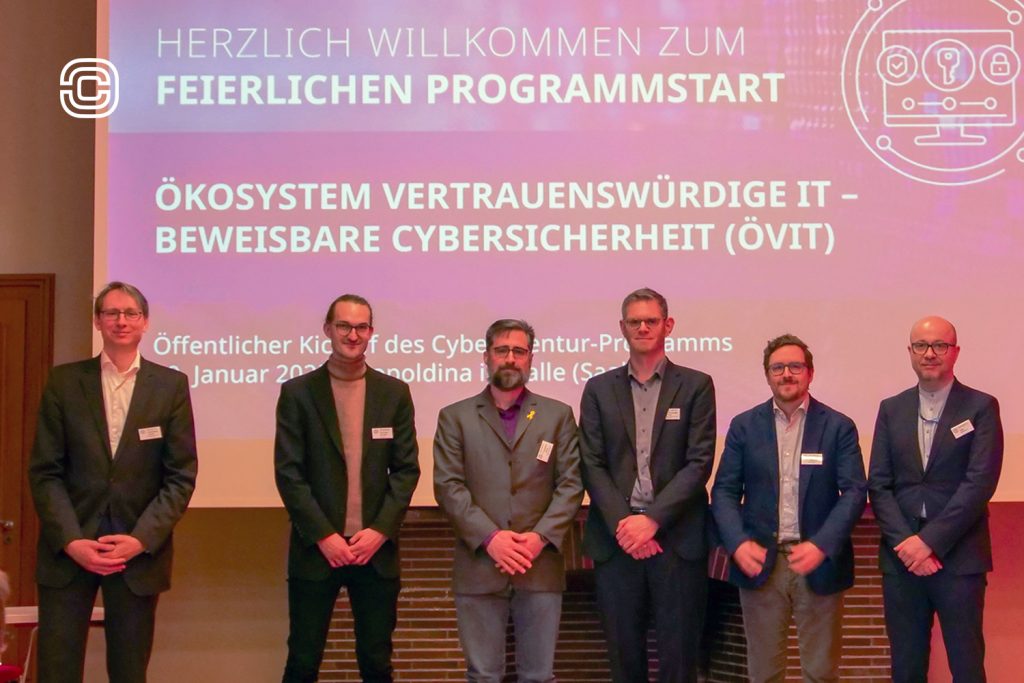Cyberagentur signs five contracts for the “Trusted IT Ecosystem” research program

The Agentur für Innovation in der Cybersicherheit GmbH (Cyberagentur) signs contracts with five companies for the “Trustworthy IT Ecosystem” (ÖvIT) research program on 20 January 2025. The aim is to formally verify verifiable IT security and establish a network of experts and users.
“The Cyberagentur has taken another decisive step towards technological sovereignty with the signing of the contract for the research projects in the “Trustworthy IT Ecosystem” (ÖvIT) programme,” emphasized Dr Markus Richter, State Secretary at the Federal Ministry of the Interior and for Home Affairs and CIO of the Federal Government, in his keynote speech at the contract signing ceremony, which he delivered via video link. “With this research program, we are strengthening Germany’s position as a pioneer in cyber security.” The event took place at the Leopoldina – National Academy of Sciences in Halle (Saale).
Neben der Keynote verwies der Leiter des Projektbüros Dresden der Cyberagentur, Dr. Christoph Hof, auf die strategischen Ziele und den innovativen Charakter dieses Forschungsprogramms innerhalb der Strategie der Innovationsagentur. Mit ÖvIT verfolgt die Cyberagentur das Ziel, durch mathematisch-logische Verfahren IT-Sicherheit auf ein bisher unerreichtes Niveau zu heben. Die Abwesenheit von maßgeblichen Sicherheitslücken soll nachweisbar gemacht werden – ein entscheidender Schritt, um sowohl hochkomplexe IT-Systeme als auch kritische Infrastrukturen sicherer zu gestalten.
The focus of the research program is international and is not only aimed at interested parties in Germany and the European Union, but also from NATO countries and beyond. “The topic of IT security, as we want it to be considered, does not stop at physical borders due to the globalization of supply chains,” explains Prof. Dr. Matthias Kranz, Head of the Cyberagentur’s Secure Systems department. “This is why we have already been able to build on a large international response to the proposals, which is ultimately also reflected in the selection of the most innovative project partners with world-leading experts. This allows us to work together with our friendly nations and value partners on IT security.”
As part of ÖvIT, contracts were awarded to five national and international companies that will drive the project forward with specific focal points:
- Projekt „Formula-V“
Barkhausen Institut gGmbH (Dresden) with subcontractors Technische Unversität Berlin, Ferrous Systems GmbH, Technische Universität Dresden, Kernkonzept GmbH, Fraunhofer AISEC (Munich)
- Projekt „PROTECT“
German Research Center for Artificial Intelligence (DFKI) Bremen, with subcontractors RWTH Aachen, Cryspen SARL (Paris), Gesellschaft für Informatik e.V. (Berlin/Bonn), Rheinland-Pfälzische Technische Universität (RPTU) Kaiserslautern, LUBIS EDA GmbH (Kaiserslautern), Universität zu Lübeck
- Projekt der Firma Kry10 (Wellington, NZ)
with subcontractor Proofcraft (Sydney, AU)
- Projekt „Clash Formal“
QBayLogic B. V., (Enschede, NL)
- Projekt „PISTIs-V“
Plan-V GmbH (München) mit Unterauftragnehmern University of New South Wales (Sydney) und Universität Göteborg
Der Neuseeländische Botschafter, S.E. Craig Hawke, zeigte besonderes Interesse an den Projektpartner aus seinem Heimatland und freute sich, dass Kry10 aus Wellington es mit ihrem Ideenansatz in die Umsetzungsphase des Forschungsprogramms geschafft hatte.
“ÖvIT not only stands for technological innovation,” explained the program manager, Dr. Sebastian Jester, Head of Secure Hardware and Supply Chains in the Cyberagentur’s Secure Systems department, “but also for building an active community of researchers, commercial providers and users”. The aim is to simplify the usability of formal verification methods and promote the transfer of knowledge. “An important step for community building is that the Cyberagentur will become a member of the seL4 Foundation at the start of the ÖvIT projects,” continues Dr. Jester. In the Kry10 and Plan-V projects, the Cyberagentur is also funding the further development of seL4, the formally verified operating system microkernel, which is freely available and verifiable as an open source project and whose maintenance is coordinated by the seL4 Foundation. The Cyberagentur’s membership emphasizes the importance of this approach for cyber security and is intended to recruit further supporters.
Die Cyberagentur finanziert das Forschungsprogramm über die kommenden 4 Jahre mit rund 42 Millionen Euro. Vorausgegangen waren fünf Vorstudien, mit deren Hilfe die Cyberagentur den Stand der Technik erfasst und Forschungsprioritäten für die jetzt startenden Projekte definiert hat. Das Programm wurde in der Abteilung „Sichere Systeme“ der Cyberagentur definiert und ausgeschrieben und wird mit Start der Projekte durch das Projektbüro Dresden unter Leitung von Dr. Christoph Hof begleitet: „Wir freuen uns, mit den Projektpartner als erstes großes Programm von Dresden aus zusammenzuarbeiten und das Zentrum des neuen Ökosystem vertrauenswürdiger IT zu werden.“
Further information and registration:
https://www.cyberagentur.de/programme/oevit/
